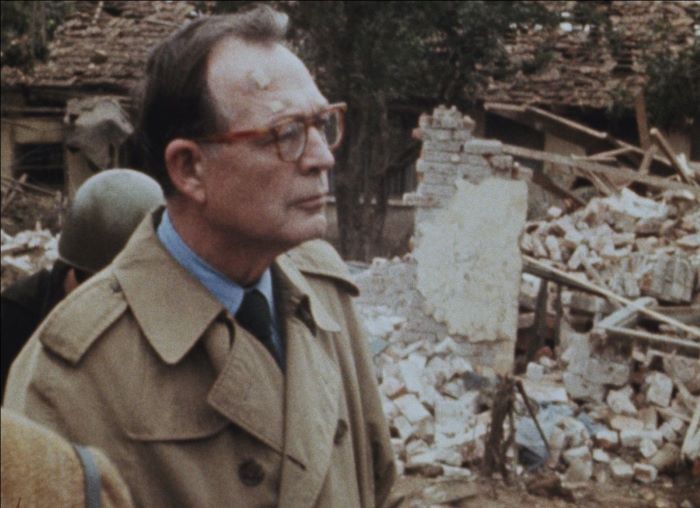![]() Although he began his career inauspiciously with the silly comedy Banana Peel (1963), Marcel Ophuls—son of Max Ophuls, whose features La Ronde, The Earrings of Madame de… and Lola Montès are on many best-of-all-time lists—has become known as a director of powerful, illuminating, and immersive documentaries, especially his classics Hotel Terminus: The Life and Times of Klaus Barbie (1988), which won the Oscar for best documentary, and The Sorrow and the Pity (1969), an incriminating indictment of French collaboration with the Germans during World War II.
Although he began his career inauspiciously with the silly comedy Banana Peel (1963), Marcel Ophuls—son of Max Ophuls, whose features La Ronde, The Earrings of Madame de… and Lola Montès are on many best-of-all-time lists—has become known as a director of powerful, illuminating, and immersive documentaries, especially his classics Hotel Terminus: The Life and Times of Klaus Barbie (1988), which won the Oscar for best documentary, and The Sorrow and the Pity (1969), an incriminating indictment of French collaboration with the Germans during World War II.
Ophuls’s 1976 documentary, The Memory of Justice (newly restored after decades of rarely being seen in theaters), might be the most expansive canvas he ever worked on. A consideration of atrocities committed during wartime and the notion of individual and collective guilt, it begins with—and focuses on for the majority of its four and a half hour running time—the Nuremberg trials following Germany’s surrender, and explores the ethics and morality of the Allied victors sitting in judgment over various Germans for what were called crimes against humanity.
The film ripples out from there to dissect the lessons of Nuremberg and apply them to the French in Algeria and the United States in Vietnam, both fresh wounds at the time of the film’s making and release. The two parts—“Nuremberg and the Germans” and “Nuremberg and Other Places”—reverberate as Ophuls constructs an ambitious investigation of, as the title alludes to, Plato’s definition of justice as a sense of duty that bonds the individual to society.
Unifying this long but intelligent and riveting film is retired American brigadier general and professor Telford Taylor, a lead prosecutor at Nuremberg whose book Nuremberg and Vietnam: An American Tragedy inspired Ophuls to make this film. Taylor potently speaks about how Nazi war crimes are paralleled by the horrible actions committed by Americans in Vietnam, for instance the My Lai massacre, in which dozens of innocent women and children were summarily executed.
Ophuls’s treatment of his vast subject is almost of necessity somewhat impressionistic and stream of consciousness. He begins with Nuremberg and moves onto Vietnam and Algeria before going back among these eras in a sort of roundelay. Most indelible about the film is not the superbly used archival video, audio. and photographs or even the shrewd use of music, from Joan Baez heartrendingly singing Pete Seeger’s “Where Have All the Flowers Gone?” in German to Yehudi Menuhin performing the exquisite Beethoven violin concerto with the Berlin Philharmonic. Instead, it’s the faces, voices, and memories of the many Ophuls interviews—at least 50 by my quick count—that are most memorable. These interview subjects range from the famous and the infamous to the ordinary and the unknown, all allowed their own truth: Hitler’s favorite architect, Albert Speer, along with other former Nazis, both repentant and unrepentant; Daniel Ellsberg, only a few years removed from the Pentagon Papers, which he leaked to the New York Times and which helped turn Americans against the Vietnam War; Edgar Faure, former prime minister of France and Nuremberg counsel, who insists that French atrocities in Algeria were different than German atrocities during World War II.
Ophuls also tracks down and talks to French soldiers who served in Algeria; Americans who left armed forces or moved to Canada to protest involvement in Vietnam; family members of those killed in action; and survivors of the Nazi death camps who testified at Nuremberg. Marie-Claude Vaillant-Couturier, a French woman who was among those witnesses, speaks movingly and hauntingly about her treatment. She describes walking past the murderous Nazis in the dock after she testifies and notices that they are simply ordinary men. When Ophuls includes actual footage of this very moment, he freezes the frame on her for a second, brilliantly visualizing her small but insightful realization.
The accumulation of details, the testimony of all of these people, no matter their biases, political, cultural or otherwise, all add up to the salient point that humanity is too complex for there to be merely good or evil, right or wrong. When Ophuls asks one of the American counsels at Nuremberg how he would have acted if he was a German during the Nazi era, he freely admits he doesn’t know.
Ophuls gives the quietly eloquent Menuhin the final word, who says that “evil is no longer confined by borders or systems” and that “judgment should really come from within the person who has committed a crime.” Those simple but profound statements return this remarkably penetrating film to its origins of the Platonic ideal of justice.

















Leave A Comment